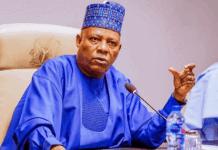Vice President Yemi Osinbajo says a more market-driven approach will be best for Nigeria’s exchange rate management as it will boost confidence and inward flows.
Osinbajo made this submission in his presentation at the 3rd Ministerial Performance Review Retreat for Ministers, Permanent Secretaries, and top Government Functionaries on Monday at the State House Banquet Hall, Abuja.
The vice president’s presentation was titled, “The President Muhammadu Buhari Administration: Reflections on the Journey So Far.’’
In his recommendations, Osinbajo said first, that there must be a synergy between fiscal and monetary policy.
“The failure of that synergy has led to unnecessary drawbacks in our economic performance and planning.
“What imports are eligible for foreign exchange must agree with the fiscal ambitions for manufacturing and industry.
“The second is that our exchange rate management continues to be an issue; the exchange rate of the naira to convertible currencies continues to face significant downward pressure because demand substantially outstrips supply.
“On one hand we have tried demand management and rationing, which has not really worked because fixing the price while the parallel market reveals a massive arbitrage merely creates the opportunity for massive rents.’’
He said that such demand management and rationing would also compound the backlog of remittances for foreign businesses who wanted to repatriate their legitimate earnings.
According to the vice president, the imperative discussion is how best to manage the situation by finding a mechanism for increasing supply and moderating demand which will be transparent and will boost confidence.
“I think that a more market-driven approach will be best; some price discovery within the context of a managed float is certainly required.
“Some efforts at controlled price discovery that had been made in the past include the Foreign Exchange Market (FEM), interbank Foreign Exchange Market (IFEM), various iterations of the Dutch Auction System(DAS), Wholesale Dutch Auction System (W-DAS), Retail Dutch Auction System (R-DAS).
“While they may not have been perfect it would appear as if the rules were clear and there was relative stability.
“When people know how they can access foreign exchange competitively this will boost confidence and inward flows will increase.”
The vice president said the focus must be on value addition and productivity in our economy.
He said the ideas were well articulated in the Medium Term Economic Plan 2021-2025–the importance of loosening generalised restrictions on trade.
Osinbajo said that blanket import restrictions were a dampener on economic activity because a lot of items that might be needed in the manufacturing process might be affected with a consequent negative impact on value addition in the economy.
“Importation itself is not the problem; it is what you import and what you do with it; it is a value-added that matters.
“This is how jobs and wealth are created; many countries of the world that manufacture is huge importers, and they import far more than Nigeria.
“ Let us take the example of garment manufacturing; Bangladesh the world’s leading garment manufacturer does not produce most of the cotton it uses.
“ It only grows two per cent of its annual cotton requirement; in 2019, Bangladesh imported 11.8 billion dollars worth of textiles and apparel while it exported 37.94 billion dollars worth of garments in the same year,’’ he said.
Earlier, while declaring the retreat open, President Muhammadu Buhari said that high-impact projects had been implemented across the country.(NAN)






















